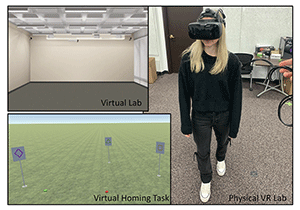Using Virtual-Reality to Assess Sensory Integration for Navigation and Balance Control in People with Chronic Symptoms after Concussion

Rehabilitation for people with persisting symptoms of imbalance and dizziness after concussion focuses on improving one’s ability to integrate sensory signals for balance control. However, daily life also requires a cognitive application of this sensory integration to remember one’s position and navigate through the surrounding environment, and these simultaneous cognitive demands of navigation may interfere with balance control. Understanding this dual-task interference caused by the simultaneous use of overlapping sensory information is essential to providing transformative rehabilitative care that improves daily life. This project will use state-of-the-art virtual reality technology and tests of dynamic sensory integration during navigation to determine the effects of concussion on spatial navigation, dynamic balance control, and their interference to guide targeted rehabilitation strategies. The long-term goal of the work is to improve rehabilitative care for people with persisting imbalance after concussion by directing patients to targeted treatments that improve their mobility and navigation in daily life. Overall, the results of this study will open a new significant line of research that can use virtual reality as an innovative and clinically-translatable assessment, and potentially future treatment, of sensory integration for spatial updating and sensory integration for balance in clinical settings for people with persisting symptoms after concussion.
Current Status
2025-01-31
For this 1U4U Innovation Funding, we investigated the impact of concussion on sensory integration for navigation and balance in a virtual reality (VR) Homing Task that reflects daily mobility. The funding from this project enabled us to program two tasks in VR to evaluate both static and dynamic balance and sensory integration, collect pilot data from people with a recent concussion and healthy controls, and receive an R21 grant from the National Center for Medical Rehabilitation Research, a part of the Eunice Kennedy Shriver National Institute for Child Health and Human Development within the National Institutes of Health. Our primary findings so far suggest that people do not efficiently navigate when only provided a single sensory cue after concussion. This project suggests sub-optimal sensory integration following concussion disrupts navigation performance as well as balance control. Our ongoing grant from the National Institutes of Health will continue to explore how concussion affects sensory integration for dynamic balance control during navigation, as well as dual-task interference between sensory integration for navigation and dynamic balance control.
Collaborators
Peter Fino
College of Health
Health & Kinesiology
Project Owner
SARAH CREEM-REGEHR
College of Social and Behavioral Science
Psychology
COLBY HANSEN
School of Medicine
Division of Physical Med/Rehab
Project Info
Funded Project Amount$30K
Keywords
concussion, rehabilitation, brain injury, balance, navigation, spatial updating, vestibular, virtual reality, mobility
Project Status
Funded 2023
Poster
View poster (pdf)
